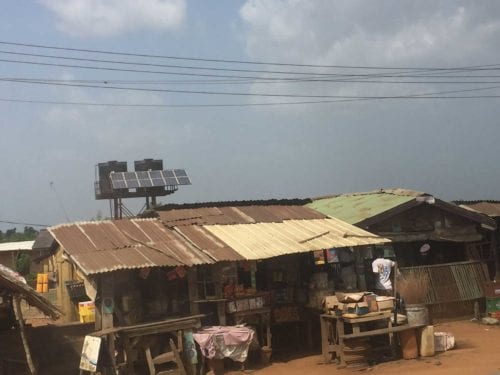
REPORT IDENTIFIES NIGERIA AS A TESTING GROUND FOR UNDERGRID MINIGRIDS
Analysis finds undergrid minigrids offer a $1 billion revenue opportunity
Lagos, Nigeria – November 26, 2018 — A new study by Rocky Mountain Institute (RMI)
and Energy Market and Regulatory Consultants (EMRC) uncovers the business case for undergrid minigrids—an approach that could benefit hundreds of millions who are currently underserved.
Throughout sub-Saharan Africa, hundreds of millions of people live “under the grid.” Such communities are within distribution company territory, but receive unreliable, inconsistent, and/or low-quality power that does not meet their needs—or they receive no power at all. Minigrids can offer an affordable, reliable solution to supplement the grid in these undergrid communities.
“EMRC believes this report serves as a call for investors to explore the minigrid potentials in Nigeria using the undergrid model. It also presents a viable alternative which is beneficial to the investors, the electricity distribution companies and the electricity consumers,” said Oladiran Adesua, analyst at EMRC.
“Undergrid minigrids are an attractive opportunity for all stakeholders. We believe that piloting this electricity solution in the near term will enable future replication that supports the sector’s financial health and drives local community development,” said Sachi Graber, senior associate at RMI.
Key benefits for minigrid developers:
An estimated 40 million rural residents are underserved by the main grid in Nigeria. Of these, close to 35% could be served by over 4,000 commercially viable undergrid minigrid systems. Nationwide, the revenue opportunity from these minigrids is approximately N400 billion ($1 billion) per year, offering minigrid developers an annual profit on the order of N75 billion ($200 million).
Key benefits for distribution companies:
For distribution companies, undergrid minigrids could reduce financial losses associated with serving remote rural communities by at least 60%. Transitioning just 400 communities to undergrid minigrids could reduce a single distribution company’s (DisCo’s) annual financial losses by about N1 billion ($3 million). With a distribution usage fee from the minigrid developer, these savings could increase to over N2 billion ($6 million) annually for the DisCo.
Key benefits for communities:
For underserved communities and customers, compared to the status quo energy mix of grid and diesel, residential customers would save an average of N54 ($0.15) per kWh. Across Nigeria, transitioning residential undergrid customers to minigrid service could yield N60 billion ($170 million) in annual savings. Meanwhile, undergrid minigrid customers benefit from better, more-reliable, cost-effective electricity service.
Stakeholders have an excellent opportunity to enable undergrid minigrids to become a successful part of an integrated approach to energy planning in Nigeria. Government and regulators, distribution companies and minigrid developers, and—most importantly—communities can work together to mutual benefit to make this happen. However, perfect need not be the enemy of the good—existing policy allows interested stakeholders to begin experimentation today.
Media Inquiries please contact:
Rocky Mountain Institute:
Nick Steel, New York,
Tel: +1 347-574-0887,
Email: nsteel@rmi.org
About Rocky Mountain Institute
Rocky Mountain Institute (RMI)—an independent nonprofit founded in 1982—transforms global energy use to create a clean, prosperous, and secure low-carbon future. It engages businesses, communities, institutions, and entrepreneurs to accelerate the adoption of market-based solutions that cost-effectively shift from fossil fuels to efficiency and renewables. RMI has offices in Basalt and Boulder, Colorado; New York City; Washington, D.C.; and Beijing.
About Energy Market and Regulatory Consultants
Energy Market and Regulatory Consultants (EMRC) are consultants and advisers in energy markets, regulation, transactions and commercial issues. We were founded in 2011 as Mercados EMI, and changed our name to EMRC in 2015. We are part of the MRC Group of Companies, a family of nine sister companies, sharing a long and common history of working together. The MRC Group of Companies has a professional team of over 80 experts, with presence in 10 different cities.